Book contents
- The Cambridge History of Magic and Witchcraft in the West
- The Cambridge History of Magic and Witchcraft in the West
- Copyright page
- Contents
- Notes on Contributors
- Introduction
- Part I Antiquity
- Part II The Early Latin West
- Part III Parallel Traditions
- Part IV Old Europe
- Chapter 10 Common Magic
- Chapter 11 Learned Magic
- Chapter 12 Diabolic Magic
- Chapter 13 Magic and Priestcraft: Reformers and Reformation
- Part V Colonial Encounters
- Part VI The Modern West
- Bibliography
- Index
Chapter 10 - Common Magic
from Part IV - Old Europe
Published online by Cambridge University Press: 05 March 2015
- The Cambridge History of Magic and Witchcraft in the West
- The Cambridge History of Magic and Witchcraft in the West
- Copyright page
- Contents
- Notes on Contributors
- Introduction
- Part I Antiquity
- Part II The Early Latin West
- Part III Parallel Traditions
- Part IV Old Europe
- Chapter 10 Common Magic
- Chapter 11 Learned Magic
- Chapter 12 Diabolic Magic
- Chapter 13 Magic and Priestcraft: Reformers and Reformation
- Part V Colonial Encounters
- Part VI The Modern West
- Bibliography
- Index
Summary
Keywords
- Type
- Chapter
- Information
- The Cambridge History of Magic and Witchcraft in the WestFrom Antiquity to the Present, pp. 303 - 331Publisher: Cambridge University PressPrint publication year: 2015

